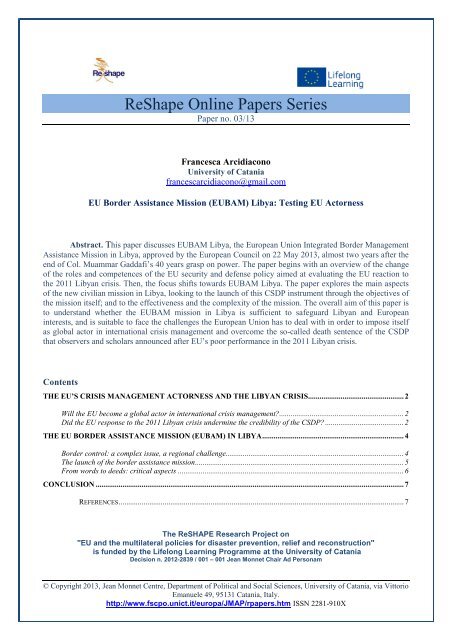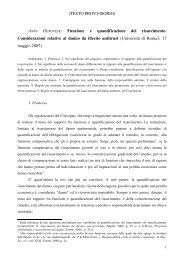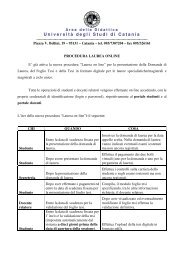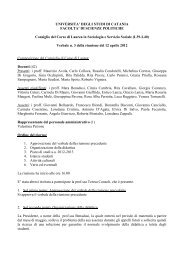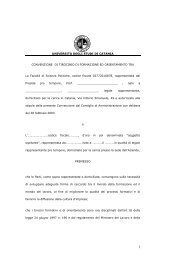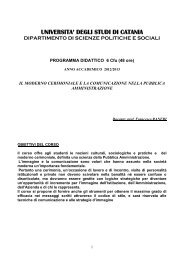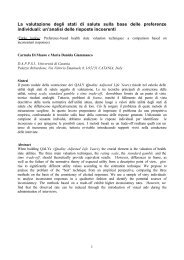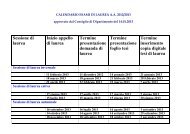(EUBAM) Libya
(EUBAM) Libya
(EUBAM) Libya
You also want an ePaper? Increase the reach of your titles
YUMPU automatically turns print PDFs into web optimized ePapers that Google loves.
ReShape Online Papers Series<br />
Paper no. 03/13<br />
Francesca Arcidiacono<br />
University of Catania<br />
francescarcidiacono@gmail.com<br />
EU Border Assistance Mission (<strong>EUBAM</strong>) <strong>Libya</strong>: Testing EU Actorness<br />
Abstract. This paper discusses <strong>EUBAM</strong> <strong>Libya</strong>, the European Union Integrated Border Management<br />
Assistance Mission in <strong>Libya</strong>, approved by the European Council on 22 May 2013, almost two years after the<br />
end of Col. Muammar Gaddafi’s 40 years grasp on power. The paper begins with an overview of the change<br />
of the roles and competences of the EU security and defense policy aimed at evaluating the EU reaction to<br />
the 2011 <strong>Libya</strong>n crisis. Then, the focus shifts towards <strong>EUBAM</strong> <strong>Libya</strong>. The paper explores the main aspects<br />
of the new civilian mission in <strong>Libya</strong>, looking to the launch of this CSDP instrument through the objectives of<br />
the mission itself; and to the effectiveness and the complexity of the mission. The overall aim of this paper is<br />
to understand whether the <strong>EUBAM</strong> mission in <strong>Libya</strong> is sufficient to safeguard <strong>Libya</strong>n and European<br />
interests, and is suitable to face the challenges the European Union has to deal with in order to impose itself<br />
as global actor in international crisis management and overcome the so-called death sentence of the CSDP<br />
that observers and scholars announced after EU’s poor performance in the 2011 <strong>Libya</strong>n crisis.<br />
Contents<br />
THE EU’S CRISIS MANAGEMENT ACTORNESS AND THE LIBYAN CRISIS.................................................. 2<br />
Will the EU become a global actor in international crisis management................................................................. 2<br />
Did the EU response to the 2011 <strong>Libya</strong>n crisis undermine the credibility of the CSDP ......................................... 2<br />
THE EU BORDER ASSISTANCE MISSION (<strong>EUBAM</strong>) IN LIBYA .......................................................................... 4<br />
Border control: a complex issue, a regional challenge............................................................................................. 4<br />
The launch of the border assistance mission ............................................................................................................. 5<br />
From words to deeds: critical aspects ...................................................................................................................... 6<br />
CONCLUSION ................................................................................................................................................................. 7<br />
REFERENCES ..................................................................................................................................................... 7<br />
The ReSHAPE Research Project on<br />
"EU and the multilateral policies for disaster prevention, relief and reconstruction"<br />
is funded by the Lifelong Learning Programme at the University of Catania<br />
Decision n. 2012-2839 / 001 – 001 Jean Monnet Chair Ad Personam<br />
© Copyright 2013, Jean Monnet Centre, Department of Political and Social Sciences, University of Catania, via Vittorio<br />
Emanuele 49, 95131 Catania, Italy.<br />
http://www.fscpo.unict.it/europa/JMAP/rpapers.htm ISSN 2281-910X
ReSHAPE Online Papers Series, no. 03/13 – June 2013<br />
The EU’s crisis management actorness and the <strong>Libya</strong>n crisis<br />
The European Union’s role and capability in international actions has been changing<br />
considerably in the last years. In 1992, the Maastricht Treaty created a range of mechanisms such as<br />
the Common Foreign and Security Policy (CFSP) and the European Security and Defense Policy<br />
(ESDP). In 1999, at Helsinki, the European Council increased its commitment in building the EU’s<br />
military and civilian capabilities in peace operations and post-conflict reconstruction.<br />
Will the EU become a global actor in international crisis management<br />
Since 2003, the EU has conducted civilian and military crisis management operations in the<br />
framework of the European Security and Defense Policy (CSDP), spanning from police and border<br />
assistance missions to robust military operations. In 2004, the EU created the border agency<br />
FRONTEX to coordinate operations between member states in securing the external borders of the<br />
Schengen area.<br />
In 2007, the Lisbon Treaty, signed also to allow the EU to become a more effective global<br />
actor, strengthened the role of the Common Security and Defense Policy (CSDP). Its remit was<br />
expanded to include the processes of post-conflict stabilization, joint disarmament operations and<br />
the “fight against terrorism”. Also, the Lisbon Treaty made two significant changes to the<br />
framework established by the Amsterdam one: the advancement of the powers of the High<br />
Representative of the Union for Foreign Affairs and Security Policy and the introduction of the<br />
European External Action Service (EEAS), the diplomatic service of the Union under the authority<br />
of the new High Representative. These changes represented an attempt to introduce new elements to<br />
make the European Council more effective, consistent and transparent for the management of<br />
foreign affairs and the CFSP. The gradual establishment of additional foreign and defense policy<br />
competences at the European level, like crisis management, has been accomplished through a<br />
progressive movement from intergovernmentalism to supranational decision-making, a disclosed<br />
commitment to multilateralism and an increased role for supranational actors and institutions in<br />
Brussels. Briefly, the European Union has “high strategic ambitions”. The question is “how to shift<br />
from words to deeds”. Up to now, the accomplishments of such ambitions have been very modest,<br />
sometimes insignificant. “Rubber stamping” and “upgrading documents” produced by diplomats<br />
and the Ministers of Foreign Affairs, as Youri Devuyust remarks (2012).<br />
Such a view some scholars share about the actorness of the EU and its legitimacy, however,<br />
acknowledges the institutional changes introduced by the Treaty of Lisbon in the current years, and<br />
looks at whether the Union is able to meet its ambitions to become “an actor capable of intervening<br />
in all theatres of the world and of playing responsibility in all the major global institutions” (Attinà,<br />
2011: 10). In other terms, it looks at understanding if the innovations introduced in 2009 will<br />
improve the decision-making and leadership of the European Union, namely its effectiveness as a<br />
global player in international crisis management.<br />
Did the EU response to the 2011 <strong>Libya</strong>n crisis undermine the credibility of the CSDP<br />
The EU response to the crisis situation in Lybia led some analysts to underline the lack of<br />
unanimity and joint decisions and the Member States’ unilateralism in action. Some of them called<br />
the <strong>Libya</strong>n crisis as the “death sentence” of the CSDP, or at least highlighted that the EU’s reaction<br />
has undermined the credibility and effectiveness of the CSDP and of the newly-founded European<br />
External Action Service (EEAS).<br />
The crisis in <strong>Libya</strong> escalated at the beginning of 2011, less than 2 years after the Lisbon<br />
Treaty came into force. On 1 April 2011, the Council of the EU adopted the decision to dispatch a<br />
European Union military operation (EUFOR <strong>Libya</strong>) in “support of humanitarian assistance<br />
Francesca Arcidiacono, EU Border Assistance Mission (<strong>EUBAM</strong>) <strong>Libya</strong>: Testing EU Actorness - 2
ReSHAPE Online Papers Series, no. 03/13 – June 2013<br />
operations in response to the crisis situation in <strong>Libya</strong>” 1 . In those months, apparently no one<br />
seriously considered an intervention under the framework of CSDP; on the contrary, on 26 February<br />
2011, the UN Security Council (UNSC) reacted to the outbreak of violence by adopting resolution<br />
1970 referring to the situation of the International Criminal Court ( ICC) and imposing arms<br />
embargo and strong sanctions. Additionally, France and United Kingdom acted within the NATO<br />
operation “Unified Protector”. Furthermore, the EUFOR mission, established in April 2011 and<br />
never launched on the field, was a military mission aimed more at supporting humanitarian<br />
assistance than at implementing an effective intervention, in fact it was decided under the request of<br />
the UN Office for the Coordination of Humanitarian Affairs (OCHA).<br />
The EU’s reaction towards the <strong>Libya</strong>n crisis was deeply criticized for being “too slow, too<br />
weak, too divided and essentially incoherent” (Kundani and Vaisse, 2011). To such strong<br />
comments, some scholars and experts answered that “making its activation dependent on the OCHA<br />
request was not only a constraint for an operation which was already planned in accordance with the<br />
United Nations Security Council Resolution 1970 and 1973, but also a debatable case of waiting for<br />
approval from a single UN agency, and an unprecedented restriction imposed on a CSDP<br />
operation/mission” (Hatzigeorgopoulos and Fara-Andrianarijaona, 2013).<br />
Such criticism notwithstanding, EUFOR <strong>Libya</strong> was neither an effective nor a timely crisis<br />
response as it never started but was just an instrument mobilized by the European Union to face the<br />
<strong>Libya</strong>n crisis. However, the European Commission reacted to the <strong>Libya</strong>n crisis by activating two of<br />
the major emergency instruments of its Directorate General (DG) for Humanitarian Aid and Civil<br />
Protection (ECHO), the civil protection mechanism and humanitarian assistance.<br />
On the whole, the EU’s immediate reaction towards the <strong>Libya</strong> descent into violence was a<br />
mix of diplomatic measures, humanitarian assistance and civil protection. The first action was to<br />
adopt diplomatic measures like declarations, official statements, high-level meetings, and sanctions<br />
to interrupt the Gaddafi’s regime flow of weapons and money. Activated on 23 February 2011, the<br />
civil protection mechanism facilitated the member state consular operations to evacuate 5.800 EU<br />
citizens. During the same month, the EU responded to Italy’s formal request and launched the<br />
Frontex Joint Operation Hermes 2011, to assist Italian authorities to deal with the migratory flows.<br />
Due to the volatile situation of North Africa and <strong>Libya</strong>, this mission was extended to include also<br />
Crete. The EU both implemented the UN Security Council sanctions against <strong>Libya</strong>, and imposed<br />
arms embargo and targeted sanctions on 26 persons related to the Qaddafi regime. On 1 April 2011,<br />
the Council adopted the already known decision on EUFOR <strong>Libya</strong> to support humanitarian<br />
assistance operation but UN OCHA did not request its activation. Lastly, on May 22, an office to<br />
support the National Transitional Council and the Lybian civil society was opened in Benghazi and<br />
then in Tripoli. In November 2011, the Office was changed into the EU Delegation in Lybia.<br />
In the field of humanitarian assistance, the initial budget was € 80,5 million. To date the EU<br />
has provided more than € 156 million in humanitarian support, and is the biggest humanitarian<br />
donor. Additionally, € 79 million were dedicated to projects with long-term perspectives concerning<br />
public administration and democratic transition, security, civil and local governance, health,<br />
vocational training and education, migration, and protection of vulnerable groups. Further € 25<br />
million were allocated through the European Neighborhood and Partnership Instrument (ENPI) to<br />
strengthening EU’s activities in the fields of education, health care and security and the rule of law.<br />
These programmes are implemented and followed up by the EU Delegation in Tripoli. On July<br />
2012, the Election Assessment Teams (EU EAT) was deployed to cover the parliamentary<br />
elections. In January 2013, <strong>Libya</strong> asked to join the Union for the Mediterranean (UfM) as an<br />
observer country.<br />
1 COUNCIL DECISION 2011/210/CFSP of 1 April 2011 on a European Union military operation in support of<br />
humanitarian assistance operations in response to the crisis situation in <strong>Libya</strong> (EUFOR <strong>Libya</strong>) http://eurlex.europa.eu/LexUriServ/LexUriServ.douri=OJ:L:2011:089:0017:0020:en:PDF<br />
Francesca Arcidiacono, EU Border Assistance Mission (<strong>EUBAM</strong>) <strong>Libya</strong>: Testing EU Actorness - 3
ReSHAPE Online Papers Series, no. 03/13 – June 2013<br />
The EU Border Assistance Mission (<strong>EUBAM</strong>) in <strong>Libya</strong><br />
The European Union Integrated Border Management Assistance Mission in <strong>Libya</strong><br />
(<strong>EUBAM</strong>) is a civilian mission under the Common Security and Defense Policy (CSDP) aimed at<br />
supporting the <strong>Libya</strong>n authorities in enhancing and developing the security of the country’s borders.<br />
In particular, the mission entails two kinds of objectives, in the short term the security of land, sea<br />
and air borders, in the long term a broader Integrated Border Management (IBM) strategy. The way<br />
to achieve these objectives is mainly the transfer of know-how. No executive function is envisaged.<br />
In fact, the planned activities consist of “training and mentoring the <strong>Libya</strong>n authorities in<br />
strengthening the border services in accordance with international standards and best practices”; “to<br />
advise the <strong>Libya</strong>n authorities on the development of a <strong>Libya</strong>n national IBM strategy”; “to support<br />
the <strong>Libya</strong>n authorities in strengthening their institutional operational capabilities” (Task, art. 3 a, b,<br />
c). 2<br />
The mission responds to an invitation by <strong>Libya</strong> and is part of the EU’s comprehensive<br />
approach to support the <strong>Libya</strong>n post-conflict reconstruction, and specifically to contribute to stateconsolidation,<br />
economic development and the fight against organized crime and terrorism.<br />
Border control: a complex issue, a regional challenge<br />
As above mentioned, this mission is part of the EU’s comprehensive approach in the <strong>Libya</strong>n<br />
post-conflict reconstruction, so it is in line with the package of activities, listed in the previous<br />
section, the EU has implemented during the last two years in <strong>Libya</strong>. It is particularly important<br />
because it addresses a relevant issue in the <strong>Libya</strong>n transition and concerns a field where the EU<br />
would continue to work: disarmament, demobilization and reintegration. What differentiates<br />
<strong>EUBAM</strong> <strong>Libya</strong> from other activities is the complexity and the extension of the issue the EU has<br />
committed to face. That is to say that the <strong>Libya</strong>n borders’ control should be seen in a wider regional<br />
perspective, considering the Maghreb and the Sahel regions. This task entails coordination with the<br />
other CSDP mission in the wider region, namely EUCAP SAHEL Niger and EUTM Mali.<br />
Furthermore, the <strong>EUBAM</strong> mission should be considered as part of an international effort aimed at<br />
developing and supporting security sector reform in line with UN Security Council Resolution<br />
1973(2011) on <strong>Libya</strong>.<br />
It is worth underlining that <strong>Libya</strong> is a large country, bordered by the Mediterranean Sea to<br />
the north, Egypt to the east, Sudan to the southeast, Chad and Niger to the south, and Algeria and<br />
Tunisia to the west. It has a 4.348 km land border and 1.770 km maritime border which are difficult<br />
to control and porous to mass migration flows (south-south immigration) and to access by criminal<br />
organizations (arms and drugs trafficking and terrorist activities).<br />
The proliferation of weapons from <strong>Libya</strong> continues at an “alarming rate”. <strong>Libya</strong> arms have<br />
flowed to more than 12 countries and have fueled conflicts in Syria, Mali and elsewhere, boosting<br />
the arsenals of extremists and criminals in the entire region. As an instance, the jihadist of the<br />
MNLA (National Movement for the Liberation of Azawad), responsible for the military campaign<br />
of the Northern Mali and numerous atrocities, had previously served in Gaddafi’s military. 3<br />
The migratory phenomenon has a double movement, inward and outward. It has gained an<br />
increasing importance since the beginning of 2012 and has involved young people from tribes<br />
located near the borders, and networks of smugglers. In some territories, it has given place to the<br />
2 COUNCIL DECISION 2013/233/CFSP of 22 May 2013 on the European Union Integrated Border<br />
Management Assistance Mission in <strong>Libya</strong> (<strong>EUBAM</strong> <strong>Libya</strong>), http://eurlex.europa.eu/LexUriServ/LexUriServ.douri=OJ:L:2013:138:0015:0018:EN:PDF<br />
p.1<br />
3 UN Security Council report, 9 March 2013, Final report of the Panel of Experts established pursuant to<br />
resolution 1973 (2011) concerning <strong>Libya</strong>, http://www.securitycouncilreport.org/atf/cf/%7B65BFCF9B-6D27-4E9C-<br />
8CD3-CF6E4FF96FF9%7D/s_2013_99.pdf<br />
Francesca Arcidiacono, EU Border Assistance Mission (<strong>EUBAM</strong>) <strong>Libya</strong>: Testing EU Actorness - 4
ReSHAPE Online Papers Series, no. 03/13 – June 2013<br />
armed occupation of the borders. 4 This statement is confirmed by data provided by the UNHCR in a<br />
report about <strong>Libya</strong>. At the end of August 2012 the UN agency registered approximately 10.000<br />
refugees and asylum seekers; in December 2013, the number increased to 12.000 refugees from<br />
various origins. On the contrary, in August 2012, the refugees fleeing <strong>Libya</strong> were approximately<br />
209.000 people. The waves of immigration from Northern <strong>Libya</strong> directly interested the European<br />
continent as proved by the large number of North African people trying to reach the Italian<br />
Lampedusa island, especially in the Spring 2011. So, this issue is important for the country and the<br />
entire Sahel as well as for the European countries directly affected. 5<br />
The European Union faced the waves of migrants from North Africa with the FRONTEX<br />
Joint Operation Hermes 2011, set up in February 2011 to assist the Italian authorities to manage the<br />
incoming flows. These waves of migration were depicted as economic and security concern on the<br />
European side of the Mediterranean. In September 2012, the EU and the <strong>Libya</strong>n officials, together<br />
with INTERPOL, established a system to control passport in order to identify wanted persons,<br />
suspected terrorists and transnational criminals.<br />
How big is the challenge <strong>EUBAM</strong> <strong>Libya</strong> is going to face was defined at a recent workshop<br />
run by the United Nations Support Mission in <strong>Libya</strong> (UNSMIL) for the Border Guards, police,<br />
customs, coastguards and other interested parties, in May 2013. In that occasion, the international<br />
organization identified weaknesses and strengths of the issue of border management in <strong>Libya</strong> and<br />
underlined the <strong>Libya</strong>n political will as well as “the shortage of modern equipment, technology,<br />
experienced personnel” and lack of comprehensive plan to secure borders from illegal traffics of<br />
arms and drugs and uncontrolled migration. 6 The Chief of Staff of the <strong>Libya</strong>n Border Guard Force,<br />
Brigadier-General Abdul-Khaleq Al-Senussi affirmed that there is shortage of personnel, weapons<br />
and technology to secure the borders and the need to rely on revolutionary brigades to do it. Other<br />
<strong>Libya</strong>ns authorities pointed out that coordination is needed to minimize the problems tied to the<br />
lack of information and systematic data. They stress that the huge issues are along the remote<br />
southern desert border (uncontrolled and porous to criminal organizations, especially because they<br />
are barely populated and economically poor) and not in the coastal or aerial borders; that <strong>Libya</strong>ns<br />
need trainings, technical expertise and more clarity in jurisdiction, and to develop the country,<br />
implementing small and medium size projects to absorb the youth and reduce tensions.<br />
The launch of the border assistance mission<br />
In January 2013, the Minister for Foreign Affairs and International Cooperation of <strong>Libya</strong><br />
addressed a letter to the High Representative of the Union for Foreign Affairs and Security Policy,<br />
welcoming the Union’s CSDP proposal to support the <strong>Libya</strong>n authorities in border security<br />
management. After several months of reflections, discussions and observations, the Council of the<br />
EU approved “the crisis management concept of <strong>EUBAM</strong> <strong>Libya</strong>”. The needs assessment on<br />
integrated border management which the EU undertook in 2012 helped define the scope and<br />
activities of the mission. Then, in March 2013, the EU deployed in the country an expert mission,<br />
consisting of 10 experts aimed at implementing the preparatory elements of the mission and holding<br />
a series of constructing discussions. 7 In the same month, the leader of the EU mission, the Director<br />
4 Affrontements armés, réseaux tribaux et prédation aux frontières de la Libye (2012), Institut de Recherche sur<br />
le Maghreb Contemporaine, http://irmc.hypotheses.org/656<br />
5 Actually, the issue of borders was already tackled in 2011, during the Paris Conference on <strong>Libya</strong>’s future<br />
where the National Transitional Council of <strong>Libya</strong>, Western leaders and important international organizations met<br />
together.<br />
6<br />
<strong>Libya</strong>n Border Security: Feverish Determination, Sobering Reality, (23 May 2013), UNSMIL<br />
http://unsmil.unmissions.org/Default.aspxctl=Details&tabid=3543&mid=6187&ItemID=1480543<br />
7 Head of EU border support mission announced (2013), http://www.libyaherald.com/2013/03/23/head-of-euborder-support-mission-announced/<br />
Francesca Arcidiacono, EU Border Assistance Mission (<strong>EUBAM</strong>) <strong>Libya</strong>: Testing EU Actorness - 5
ReSHAPE Online Papers Series, no. 03/13 – June 2013<br />
General of the Finnish customs service, Antti Hartikainen, was chosen and rapidly deployed in the<br />
theatre.<br />
The current 24-months mission <strong>EUBAM</strong> <strong>Libya</strong> was officially established on 22 May 2013,<br />
through a formal decision by the European Council, with the aim of enhancing the security of<br />
<strong>Libya</strong>’s borders in the short term, and a broader IBM strategy in the long term. On that occasion,<br />
the High Representative Catherine Ashton stressed that "<strong>EUBAM</strong> <strong>Libya</strong> is an important mission for<br />
<strong>Libya</strong> and the entire region, but also for the security of EU borders", concept perfectly in line with<br />
the problematic and complex framework above depicted. She also said that “the mission responds to<br />
a direct request from our <strong>Libya</strong>n partners” and that “it can now be deployed in June”. 8<br />
The mission should be endowed with approximately 110 staff and a budget of € 30,3 million<br />
for the first 12 months (the mission should last 24 months). The mission will deploy gradually<br />
taking due account of the political and security situation as well as the local needs. As the mission<br />
should entail a transfer of know-how, the 165 staff (at full operational capability) will be made by<br />
the head of mission, 83 seconded staff, 27 international staff and 54 locally-recruited staff.<br />
From words to deeds: critical aspects<br />
The Headquarters of the Mission will be based in Tripoli, in the North of the country; not in<br />
the South as originally planned since the main areas tackled like the lack of security in the borders<br />
due to arms and drugs trafficking and uncontrolled migrations are concentrated in southern <strong>Libya</strong>.<br />
However, it could not be considered a determinant factor, though it remains an influent one,<br />
because the main task of the experts is to provide medium and long term recommendations for<br />
secure border management to help <strong>Libya</strong>n authorities in strengthening border control capacity and<br />
defining a national integrated Border Management strategy.<br />
On the other hand, the location of the Headquarters points out the short-term priority of the<br />
EU in securing itself by prioritizing the Mediterranean coast. Actually, even if the situation in the<br />
Sahel region is more stable than it was in past months, this area remains an hotbed for criminal<br />
organizations and illegal traffics. On the long term, then, the EU’s perspective should be narrow,<br />
because the problems of the South could infringe the Union’s interests, especially in the long-run.<br />
Furthermore, the comprehensive approach the EU would implement has to take in due<br />
consideration the dynamics of the entire region, the interdependencies of the local countries, not<br />
only in term of South-South migration but also concerning illegal trafficking and criminal<br />
organizations.<br />
The challenge the EU is going to face is huge though cooperation on migration control and<br />
border management is an area well known to the EU due to its past activities in this field. However,<br />
in addition to some inconsistency and political ambivalence, another weakness is lack of linearity in<br />
as much as the EU seems not so much committed to decisive actions towards Disarmament,<br />
Demobilization and Reintegration (DDR) and towards the Security Sector Reform (SSR). Both<br />
DDR and SSR are naturally part of the EU’s response to the situation in <strong>Libya</strong>. They are managed<br />
by the EU Delegation in Tripoli. After several months, the new Head of the delegation, Nataliya<br />
Apostolova, has been appointed on 21 May 2013. She has an enormous amount of programmes and<br />
funds to manage but a small staff and scarce organization resources. This could represent a critical<br />
point for the effectiveness of the mission in a wider perspective: “financial aid administered through<br />
a three persons-strong EU Delegation in Tripoli is likely to quite insufficient to achieve the goal of<br />
building a democratic, stable and prosperous country” (Hatzigeorgopoulos and Fara-<br />
Andrianarijaona, 2013: 13).<br />
8 Green light for civilian mission to support border security in <strong>Libya</strong> (22 May 2013), Council of the European<br />
Union, Brussels, 9478/13, Press 189 in<br />
http://www.consilium.europa.eu/uedocs/cms_data/docs/pressdata/EN/foraff/137189.pdf<br />
Francesca Arcidiacono, EU Border Assistance Mission (<strong>EUBAM</strong>) <strong>Libya</strong>: Testing EU Actorness - 6
ReSHAPE Online Papers Series, no. 03/13 – June 2013<br />
Conclusion<br />
After the EU’s failure in facing the <strong>Libya</strong>n civil war, the <strong>EUBAM</strong> mission is an hazardous<br />
task for the EU. Its failure will have negative consequences on the credibility of the EU’s CSDP.<br />
Divisions among the member states, which are difficult to overcome, are the reason why EU<br />
interventions are always slow, badly- and micro-managed and too weakly mandated. A clear<br />
instance of these divisions is proved by the fact that on 2 June 2013, France offered to help <strong>Libya</strong><br />
secure borders from Islamists fleeing Mali, as said by the Defense Minister Jean-Yves Le Drian. He<br />
and the President Francois Hollande pushed the prime minister Ali Zeidan to attach importance to<br />
the issue of security and borders especially in the south. The Minister did neither talk about any<br />
kind of EU coordination nor mentioned the <strong>EUBAM</strong> <strong>Libya</strong> mission. On the contrary, he spoke<br />
about the unanimous decision by the Security Council, including China, to gradually get out of the<br />
military phase, the threats tied to regional insecurity, the interdependence with the situation in Mali,<br />
the settlement of terrorists groups and the growth of terrorism in North Africa. This is clear example<br />
of the fact that some EU’s member states act in a way totally detached from that of the European<br />
Union.<br />
The European Union has the potentialities to act at the global level but the lack of strategic<br />
consensus does not allow it. It is not a question of time and capacity, neither one tied to the famous<br />
metaphor on the transatlantic division of labor, according to which NATO “prepares dinner” while<br />
the EU “washes the dishes”. It is a matter of internal coherence/division, political will, geographical<br />
perspectives, briefly the inability of making divergences fit through “negotiated” internal<br />
convergence to the common interest of the states. The interplay of these factors causes<br />
compromises with negative results such as in the <strong>Libya</strong>n civil war where the EU members did not<br />
adopted a common position in the U.N. Security Council in regard to the establishment of the nofly<br />
zone over <strong>Libya</strong>.<br />
References<br />
Attinà F. (2011), Assessing the EU’s commitment to multilateralism CSDP and Member States’ propensity<br />
to participate in peace missions, in “Australian and New Zealand Journal of European Studies”, 3, 2, 5-17.<br />
Cmakalová K. and Rolenc J. (2012), Actorness and legitimacy of the European Union, in “Cooperation and<br />
Conflict”, 47, 2, 260-270.<br />
Devuyst Y. (2012), The European Council and the CFSP after the Lisbon Treaty, in “European Foreign<br />
Affairs Review”, 17, 3, 327–350.<br />
Hatzigeorgopoulos M. and Fara-Andrianarijaona L. (May 2013), <strong>EUBAM</strong> <strong>Libya</strong>: story of a long-awaited<br />
CSDP mission, European Security Review, ESR 66 – May 2013, International Security Information Service,<br />
Europe,<br />
http://www.isis-europe.eu/sites/default/files/publicationsdownloads/esr66_<strong>EUBAM</strong><strong>Libya</strong>_May2013MHLA_0.pdf<br />
Hix S. and Hoyland B. (2011), The Political System of the European Union, Palgrave MacMillan, Great<br />
Britain, pp. 310-319.<br />
Howorth J. (2012), Decision-making in security and defense policy: Towards supranational<br />
intergovernmentalism, in “Cooperation & Conflict”, 47, 4, 433-453.<br />
Koenig N. (2012), The EU and the <strong>Libya</strong>n Crisis- In Quest of Coherence, The International Spectator:<br />
Italian Journal of International Affairs, http://www.iai.it/pdf/DocIAI/iaiwp1119.pdf.<br />
Francesca Arcidiacono, EU Border Assistance Mission (<strong>EUBAM</strong>) <strong>Libya</strong>: Testing EU Actorness - 7
ReSHAPE Online Papers Series, no. 03/13 – June 2013<br />
Kundani H. and Vaisse J. (2011), EU Foreign Policy: Moving on from <strong>Libya</strong>, opendemocracy,<br />
http://www.opendemocracy.net/hans-kundnani-justin-va%C3%AFsse/eu-foreign-policy-moving-on-fromlibya.<br />
Other references<br />
Affrontements armés, réseaux tribaux et prédation aux frontières de la Libye (2012), Institut de Recherche<br />
sur le Maghreb Contemporaine, http://irmc.hypotheses.org/656<br />
Alison Williams (31 May 2013), France says south <strong>Libya</strong> Islamists likely behind embassy attack,<br />
http://www.reuters.com/article/2013/05/31/us-libya-france-idUSBRE94U0S620130531<br />
COUNCIL DECISION 2011/210/CFSP of 1 April 2011 on a European Union military operation in support<br />
of humanitarian assistance operations in response to the crisis situation in <strong>Libya</strong> (EUFOR <strong>Libya</strong>), http://eurlex.europa.eu/LexUriServ/LexUriServ.douri=OJ:L:2011:089:0017:0020:en:PDF<br />
COUNCIL DECISION 2013/233/CFSP of 22 May 2013 on the European Union Integrated Border<br />
Management Assistance Mission in <strong>Libya</strong> (<strong>EUBAM</strong> <strong>Libya</strong>), http://eurlex.europa.eu/LexUriServ/LexUriServ.douri=OJ:L:2013:138:0015:0018:EN:PDF<br />
EU Border Assistance Mission (<strong>EUBAM</strong>) in <strong>Libya</strong>, Common and Security Defense Policy, European Union<br />
External Action Service, http://www.eeas.europa.eu/csdp/missions_operations/eubamlibya/eubam_factsheet_en.pdf<br />
Final report of the Panel of Experts established pursuant to resolution 1973, (2011) concerning <strong>Libya</strong> (9<br />
March 2013), UN Security Council report, http://www.securitycouncilreport.org/atf/cf/%7B65BFCF9B-<br />
6D27-4E9C-8CD3-CF6E4FF96FF9%7D/s_2013_99.pdf<br />
Green light for civilian mission to support border security in <strong>Libya</strong>, (22 May 2013), Council of the European<br />
Union, Brussels, 9478/13, Press 189,<br />
http://www.consilium.europa.eu/uedocs/cms_data/docs/pressdata/EN/foraff/137189.pdf<br />
Head of EU border support mission announced (2013), http://www.libyaherald.com/2013/03/23/head-of-euborder-support-mission-announced/<br />
Nataliya Apostolova nommée chef de la délégation de l'UE en Libye (21 May 2013), http://enpiinfo.eu/medportal/news/latest/33142/Nataliya-Apostolova-nomm%C3%A9e-chef-de-la-d%C3%A9gationdel’UE-en-Libye<br />
<strong>Libya</strong>n Border Security: Feverish Determination, Sobering Reality, (23 May 2013), UNSMIL<br />
http://unsmil.unmissions.org/Default.aspxctl=Details&tabid=3543&mid=6187&ItemID=1480543<br />
Francesca Arcidiacono, EU Border Assistance Mission (<strong>EUBAM</strong>) <strong>Libya</strong>: Testing EU Actorness - 8


